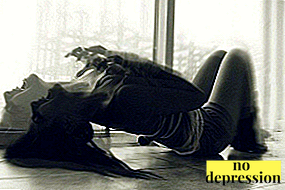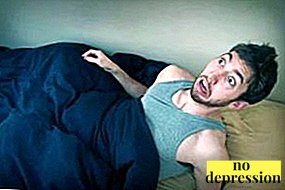At the end of the XIX century psychologist William James described an amazing incident with priest Ansel Sturn.
This man suddenly moved to an unfamiliar city and opened a shop there. A man lost his memory and started a new life, but after a while remembered my past.
William James, having studied this oddity, gave her the definition of “fugue”, which means “ "escape". Now in psychology, this state is called a dissociative fugue and is equated with pathology.
Essence of the concept

Fugue condition - what is it in psychiatry?
Dissociative fugue - This is an acute mental disorder, characterized by an absolute loss of memory about his personality and an unforeseen move.
According to statistics, 0.2% of the population. During the period of the pathological condition, the patient forgets all the information about himself, starting with the name and ending with the profession.
He leaves the familiar atmosphere, invents himself a new personality, biography and begins another life. The journey seems deliberate and organized. Often a person goes to places that were previously familiar and emotionally significant.
In a state of fugue, the patient does not even suspect that he is unwell. Outwardly, everything that happens looks like a normal life of an ordinary person.
In mind general information is stored (for example, school knowledge), the ability to memorize the new remains, the consciousness is not disturbed, the intellect does not suffer.
Dissociative fugue lasts from several hours to several months. It happens that the pathological condition is stretched for years. May end unexpectedly.
Just once a man suddenly returns to his real identity. Moreover, all information about life in the disorder stage is forgotten. Exit from the fugue is almost always accompanied by sharp negative emotions.
The causes of the pathology

According to experts, the dissociative fugue is defense mechanismguarding the psyche from the painful experiences and severe stresses.
In those situations when a person feels an unbearable desire to escape, the body satisfies this desire with the means available to him.
Information is “blocked” by the subconscious and the patient can do nothing about it.
there is a number of causes leading to this disorder. They are based on severe moral upheaval, nervous strain and the danger of physical destruction. This includes:
- Loss of meaningful relationships.
- Participation in the war, living in the territory of the conflict, direct observation of the maneuvers.
- Being in the epicenter of a natural or man-made disaster.
- The death of a large number of native people in a small period of time.
- The desire to protect themselves from physical violence, to hide from threats, to hide from their abuser.
The state of the fugue also develops for less significant reasons. Stimulus to the occurrence of the disease can serve:
 a difficult financial situation or sudden problems with money;
a difficult financial situation or sudden problems with money;- family conflicts;
- difficult situation at work;
- insults;
- domestic difficulties.
Whatever the reasons, in the first place to the disorder leads serious intrapersonal conflict, unwillingness to agree with the existing reality, an attempt at any price to get away from emotional trauma.
The probability of occurrence of the disease is most high among alcoholics, drug addicts, as well as people with various phobias, high anxiety, choleric temperament, hysteroid personality type.
If a patient has other mental disorders (for example, schizophrenia), then a fugue may appear more than once. In other cases, relapse does not happen.
Symptoms
Onset of frustration
The pathological condition begins unexpectedly it is impossible to predict. As a rule, a person “runs into another reality” in the morning after a night's sleep.
The patient wakes up and first performs the usual actions: makes the bed, puts himself in order, has breakfast.

Then suddenly begins to prepare for the move, pack your bags.
It also happened that the patient left light, without things.
Describes the situation when on the eve of the trip, people went to the bank and withdrew impressive amounts from their accounts.
Life in a new place
In the changed conditions, a person leads a measured lifestyle, he calm and adequate. The environment does not have any suspicions about his personality.
If the period of a fugue stretches for a long time, then some patients manage to create a believable biography, get a new job, start a relationship, and even have a child.
Periodically in the minds of the patient may occur fragmentary memories of past life. They appear as dreams or are remembered as parts of plots from books read.
Inconsistency of the stories of a person with his real identity can be found during the verification of documents, for example, during the desire to take a loan or after a criminal incident. It is then that it turns out that the patient gave himself out for another.
Completion of the pathological condition

Fugue Period ends as unexpectedly, as begins "escape into a new life." The “return” of a real person is carried out after a night of sleep.
Upon awakening, the patient cannot understand where he is and why everything is unfamiliar. His anxiety and anxiety increase, he cannot sit still, he becomes nervous.
Returning to the old life is hard. The patient is difficult to adapt to the changes that occurred while he was not.
At the same time about its existence in the period of frustration completely forgets. Information about work, friends, acquaintances and even children is erased from memory. Memories of this can come in a dream in the form of separate fragments.
If the fugue is long, then the transition from the new to the old person will take place gradually.
First, the person will be covered with anxiety and the feeling that everything that is happening is wrong. He will feel loss of something meaningful. The memory will begin to fill with scenes from the past life.
Real person, consistently "manifesting", will take its place. At the final stage, the patient will experience anxiety, bad mood, fear, and social disorientation.
Diagnosis and treatment
How to recognize?

Examination of the patient during the fugue period is impossible, as the person arrives at the hospital after the attack and return to the old life.
The diagnosis is determined by a specialist after the fact.
In order not to be mistaken with the conclusions, the doctor draws attention to the following features, characteristic only for fugues:
- Dissociative amnesia. The patient loses memory of recent events that are personal. Universal knowledge and skills are preserved, as is the ability to perceive new information.
- Targeted departure. Man does not wander or lose. He just arrives at a particular place. In this case, the reason for the trip to the patient is unknown.
- Social interaction. The patient is not closed in himself, he adequately communicates with others. Also, do not forget to take care of yourself, maintain hygiene, eat in time.
Apart from these signs, people experiencing a fugue attack are absolutely healthy both mentally and physiologically.
Therapy methods
Psychiatrists, psychotherapists and clinical psychologists deal with the disease. The help of specialists covers two areas:
- Work on the transformation of the human attitude to the stressful circumstances that provoked the attack.
- Support in understanding and accepting the changes that occurred during the fugue.

First of all, conversations are held with the patient, the purpose of which is the least painful return to his normal life.
Also, experts will use the following techniques:
- positive therapy;
- personality-oriented therapy;
- rational therapy;
- psychoanalysis;
- hypnosis.
The appointment of tranquilizers and antidepressants is possible if a person has affective disorders and persistent anxiety.
Recovery prognosis favorable. A patient who has no other mental illness is fully recovered.
Prevention
Normal state of mind broken by inner loneliness. A person who, in difficult times, is not able to ask for help and accept it, may one day be held hostage to a fugue disorder.
To avoid a pathological condition, one should lead a healthy lifestyle, have a social circle where mutual assistance is adopted. Stress tolerance training, the ability to solve problems will also save you from many negative consequences.

Dissociative fugue is not dangerous to the physical health of the person, does not pose a threat to others.
However, the disorder has serious psychological and ethical consequences.
The patient often experiences tension, discomfort, painful shame in front of people whom he unintentionally deceived.
The video tells about the dissociative fugue:

 a difficult financial situation or sudden problems with money;
a difficult financial situation or sudden problems with money;

